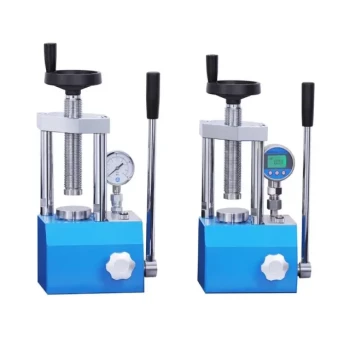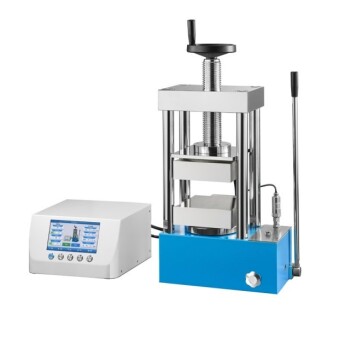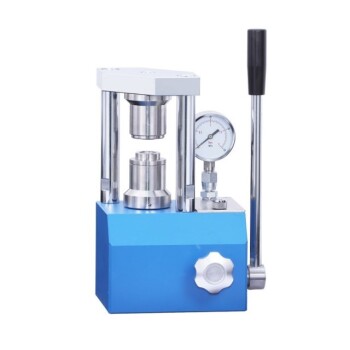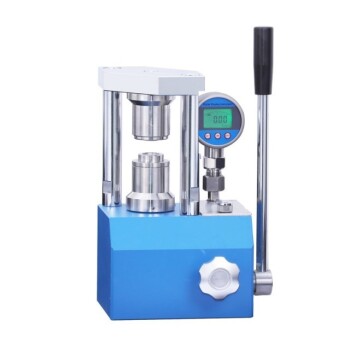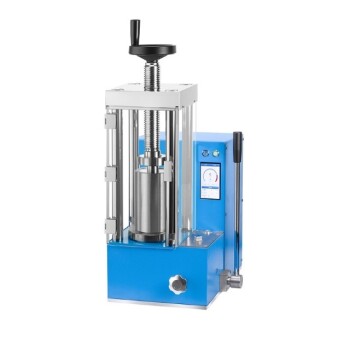In short, tension testing is a fundamental engineering process where a material sample is pulled apart until it breaks to measure its strength and ductility. While a "press" typically compresses, the hydraulic systems within universal testing machines generate the immense, controlled pulling force required for this analysis, providing critical data for manufacturing and construction quality assurance.
The core purpose of using hydraulics in tension testing is not to press, but to apply a highly controlled and powerful tensile (pulling) force. This process reveals a material's precise breaking point and its ability to deform, ensuring it meets the safety and performance standards for its intended application.

The Fundamentals of Tension Testing
Tension testing, also known as tensile testing, is a destructive process that provides a wealth of information about a material's mechanical properties under load. It is one of the most common and important forms of material analysis.
What Is Being Measured?
The test quantifies several key properties. The most critical are tensile strength, which is the maximum stress the material can withstand while being pulled, and ductility, which measures how much the material can stretch or deform before it fractures.
Engineers also measure the yield strength, the point at which the material begins to deform permanently, and the modulus of elasticity, which defines its stiffness.
How the Test Is Performed
A standardized sample of the material, often shaped like a "dog bone," is securely clamped into the grips of a testing machine. The machine then pulls the sample from both ends at a constant, slow rate.
A device called an extensometer is attached to the sample to precisely measure its elongation as the force, or load, increases. The test continues until the sample breaks apart.
The Stress-Strain Curve
The data from the test is plotted on a graph known as a stress-strain curve. This curve is a unique fingerprint for the material, visually representing its strength, stiffness, and ductility, and allowing engineers to compare different materials objectively.
The Role of Hydraulics in Generating Force
The term "hydraulic press" can be misleading in this context. The key component is the hydraulic system, which is a master at generating and controlling massive forces for various tasks, including tension.
Creating Tension, Not Compression
The machine used is typically a Universal Testing Machine (UTM), which can perform both tension and compression tests. Its power source is often a hydraulic system.
This system uses Pascal's principle, where a small force applied to a contained fluid generates an immensely larger force. The machine's mechanical design converts this hydraulic power into a precise, linear pulling motion on the sample.
Why Hydraulic Power is Essential
Hydraulic systems are ideal for this application because they can generate exceptionally high forces within a compact design, which is necessary to pull apart strong materials like steel or high-strength alloys.
More importantly, they offer unparalleled control. The force can be applied very slowly and steadily, which is critical for gathering accurate data and observing the exact points of material failure.
Understanding the Key Distinctions
A common point of confusion is the difference between tension and compression, and the varied uses of a hydraulic press. Clarifying this is essential for proper analysis.
Tension vs. Compression Testing
Tension testing pulls a material apart to measure its strength against stretching forces. This is crucial for things like cables, bolts, and structural beams that are under tension.
Compression testing squeezes a material to measure its strength under crushing forces. This is vital for components like concrete columns, bearings, or support struts. A Universal Testing Machine can often perform both.
The "Press" as a Sample Preparation Tool
Separately from tension testing, standard hydraulic presses are also used in laboratories to prepare samples for other forms of analysis.
For example, a press is used to compact a powder into a uniform pellet or thin film. This ensures the sample has a consistent density, which is critical for accurate results in techniques like spectroscopic analysis. This is a compression task, distinct from tension testing.
Making the Right Choice for Your Goal
The data from tension testing is not abstract; it directly informs critical engineering and manufacturing decisions.
- If your primary focus is quality assurance: Use tension testing to verify that incoming batches of raw materials (like metals or plastics) meet the required strength and ductility specifications before they enter production.
- If your primary focus is product design and engineering: Rely on stress-strain curve data to select the right material for an application and to predict potential failure points in your design under real-world loads.
- If your primary focus is research and development: Employ tension testing to characterize the fundamental properties of new materials, such as advanced alloys or composites, to determine their viability for future applications.
Ultimately, understanding a material's response to tension is fundamental to designing and building safe, reliable, and efficient products.
Summary Table:
| Aspect | Details |
|---|---|
| Test Type | Destructive tensile testing to pull material until failure |
| Key Measurements | Tensile strength, yield strength, modulus of elasticity, ductility |
| Equipment Used | Universal Testing Machine (UTM) with hydraulic system for force generation |
| Main Applications | Quality control, product design, R&D for materials like metals and composites |
| Benefits of Hydraulics | High force control, precise pulling motion, steady application for accurate data |
Enhance your laboratory's material testing capabilities with KINTEK's advanced lab press machines! Whether you need automatic lab presses, isostatic presses, or heated lab presses for precise sample preparation and analysis, our solutions deliver reliable performance and accurate results. Contact us today to discuss how we can support your quality assurance and research goals with tailored equipment and expert guidance.
Visual Guide

Related Products
- Manual Heated Hydraulic Lab Press with Integrated Hot Plates Hydraulic Press Machine
- Laboratory Hydraulic Split Electric Lab Pellet Press
- Automatic Laboratory Hydraulic Press Lab Pellet Press Machine
- Laboratory Hydraulic Press Lab Pellet Press Button Battery Press
- Manual Laboratory Hydraulic Pellet Press Lab Hydraulic Press
People Also Ask
- Why is high-precision temperature control of laboratory hydraulic press heating plates critical for wood densification?
- What are the applications of hydraulic heat presses in material testing and research? Enhance Precision and Reliability in Your Lab
- How is the temperature of the hot plate controlled in a hydraulic lab press? Achieve Thermal Precision (20°C-200°C)
- What are the key technical requirements for a hot press machine? Mastering Pressure and Thermal Precision
- What makes laboratory presses durable and consistent? Key Design and Control Insights




